(完整版)外研社小学英语一起小学四年级下语法总结及练习题
外研社小学英语一起小学四年级下语法总结及练习题

外研社小学英语一起小学四年级下语法总结及练习题祈使句练题表达说话人对对方的叮嘱、劝告、请求或命令等,往往有表示请求、命令、希望、禁止、劝告等意思。
祈使句一般没有主语,实际上是省略了主语"You"。
句末用感叹号或句号,用降调朗读。
肯定结构都以动词原形开头。
祈使句的肯定句式有三种形式,即:1) Do型(以行为动词原形开头),例如:Sit down坐下!Stand up起立!2) Be型(以be开头),例如:Be quiet!安静!3) Let型(以let开头),例如:Let me help you.祈使句的否定结构是以"Don't+动词原形"开头。
例如:Don't go there。
please。
请别去那儿。
Don't be late。
不要迟到。
用括号内所给动词的适当形式填空。
1.Don't be late.2.Dust the dressing table.3.Don't speak with your mouth full of food.4.Don't talk and read a book.5.Don't drop the nice vase。
Sam.6.Look out。
A car is coming.7.Give us ten years and just see what our country will be like.8.Don't let the baby cry.9.Open the window and shut the door.10.Let'XXX.根据要求改写句子1.Read it again more slowly。
please。
(改为祈使句)2.Don't sit next to Nancy。
(改为否定句)1.There are no us formatting errors in the article。
外研版(一年级起点)四年级下M1-M10 重点短语、句子总结

M1知识点A单词:welcome 欢迎potato马铃薯,土豆put,放,安放,放置wait等,等待A 短语:1 welcome to our factory欢迎来我们的工厂2 put the crisps in the bags把薯片放进袋子里put …in…把…放到…里A 句子:Don’t touch the machines,please!请不要触摸机器B :单词:machines机器crisp炸薯片sir先生dangerous危险的each各自,每个短语:have a bag of crisps有一包薯片句式:Don’t+ 动词原形不要做某事。
M1知识点U2A句子:Dou’t feed the fish!不要喂鱼!B短语:1 walk on the grass在草地上走2 write on the books在书上写字句子:1 Don’t walk on the grass!不要在草地上走!2 Dou’t play ball games here!不要玩球类的游戏3 Dou’t talk!不要讲话!4 Don’t write on the books!不要在书上写字Don’t+动词原形不要做某事M2知识点U1单词:email电子邮件短语:send emails to…给….发送电子邮件句子:Is it expensive ? No, it’s cheap, but it’s beautiful. It’s pink.它贵吗?不,它很便宜,但是它很漂亮。
它是粉色的。
单词:cheap便宜的expensive昂贵的send发送,寄短语: buy a computer for me给我买一台电脑句子:1 Is it big?Yes,it is。
它大吗?是的,它很大2 Is it beautiful?Well,it’s not beautiful,but it’s helpful。
它漂亮吗?它不漂亮,但是它很有用。
最新外研版小学四年级英语下学期知识点总结
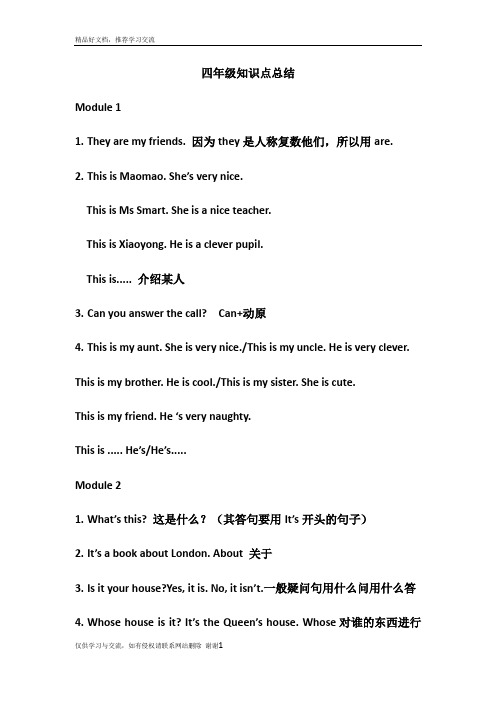
四年级知识点总结Module 11.They are my friends. 因为they是人称复数他们,所以用are.2.This is Maomao. She’s very nice.This is Ms Smart. She is a nice teacher.This is Xiaoyong. He is a clever pupil.This is..... 介绍某人3.Can you answer the call? Can+动原4.This is my aunt. She is very nice./This is my uncle. He is very clever. This is my brother. He is cool./This is my sister. She is cute.This is my friend. He ‘s very naughty.This is ..... He’s/He’s.....Module 21.What’s this? 这是什么?(其答句要用It’s开头的句子)2.It’s a book about London. About 关于3.Is it your house?Yes, it is. No, it isn’t.一般疑问句用什么问用什么答4.Whose house is it? It’s the Queen’s house. Whose对谁的东西进行提问Queen’s house名词所有格,表示......的5.It’s close to the Queen’s house. Close to 靠近6.London Bridge is falling down. Be(am ,is, are)+v.ing 表示正在发生的事情。
现在进行时态。
Module 3.1.Sam can ride a bike. Amy can fly a kite. Can+ 动原ride a bike译为骑自行车。
(完整版)外研社小学英语一起小学四年级下语法总结及练习题

(完整版)外研社小学英语一起小学四年级下语法总结及练习题外研社英语一起四年级上语法总结及练习题祈使句表达说话人对对方的叮嘱、劝告、请求或命令等,往往有表示请求、命令、希望、禁止、劝告等意思.祈使句一般没有主语,实际上是省略了主语“You”.句末用感叹号或句号,用降调朗读.肯定结构都以动词原形开头.祈使句的肯定句式有三种形式,即1)Do型(以行为动词原形开头),例如:Sit down 坐下! Stand up 起立!2)Be型(以be开头),例如:Be quiet!安静!3)Let型(以let开头),例如:Let me help you.祈使句的否定结构是以“Don’t+动词原形”开头.例如:Don’t go there,please.请别去那儿.Don’t be late.不要迟到用括号内所给动词的适当形式填空。
1. __________ (not, be) late.2. ____________ (dust) the dressing table.3. ____________ (not, speak) with your mouth full of food.4. ____________ (not, talk) and ____________ (read) a book.5. ____________ (not, drop) the nice vase, Sam.6. ____________ (look) out! A car is coming.7. ____________ (give) us ten years and just see what our country will be like.8. ____________ (not, let) the baby cry.9. ____________ (open) the window and ____________ (shut) the door.10. Let’s ____________ (sweep) the floor.根据要求改写句子1. Will you please read it again more slowly? (改为祈使句)__________ __________ again more slowly, please.2. Please sit next to Nancy. (改为否定句)__________ __________ next to Nancy.3. Come to my house tomorrow. (改为否定句)__________ come to my house tomorrow.4. Wear the glasses! (改为否定句)___________ wear the glasses!5. Don’t wash your hands! (改成肯定句)___________ your hands!一般过去时时间状语:1.yesterday,morning(afternoon,evening)等2.由“last+一时间名词”构成的短语:last night,last year(winter,month,week)等3.由“时间段+ago”构成的短语:a moment ago,a short time ago,an hour ago等4.其它:just now等Was,were的一般过去时构成:肯定句式:主语+be(was,were)+其它.否定句式:主语+be(was,were)+not+其它.一般疑问句:Be(was,were)+主语+其它?肯定回答: Yes, 主语+ be(was,were)否定回答:No, 主语+be(was,were)+not.含有实义动词(行为动词)的一般过去时的主结构:构成:肯定句:主语+动词的过去时+其它。
外研社小学英语一年级起点四年级下册 Module2 单词练习+语法练习

Module2 单词练习+语法练习
一、根据句子的中文含义填写单词
1.I can _______ an ______ to you.
我可以发送一封邮件给你。
2.It _______s one hundred and eight _______.
它花了108元。
3.This bag is _______.
这个书包是蓝色的。
4.These flowers are _______.
这些花是粉色的。
5.This pen is _______.
这只钢笔是便宜的。
6.This football is _______.
这个足球是贵的。
7.What ______?
什么颜色?
二、判断这些单词划横线部分的自然拼读是否一致,一致打✔,不一致打×
三、把下面的句子从陈述句变成一般疑问句,并且翻译一般疑问句。
举例:
She is nice.
一般疑问句:Is she nice?
中文:她友好吗?
1.It is cheap.
一般疑问句:
中文:
2.This pen is expensive.
一般疑问句:
中文:
3.This flower is beautiful.
一般疑问句:
中文:
4.The bag is blue.
一般疑问句:
中文:。
(完整版)外研版(一年级起点)四年级英语[下册]第1_3模块知识点和习题
![(完整版)外研版(一年级起点)四年级英语[下册]第1_3模块知识点和习题](https://img.taocdn.com/s3/m/21bde4bc3968011ca200911e.png)
Module 1【关键知识点】✧“要别人做某事或不做某事”用祈使句,句中动词要用原形。
➢表示禁止的:Don’t…please!➢表示肯定的:Wear… please!祈使句:动词原形开头,省略主语(变否定直接在动词前面加Don’t)Eg:Open the door,变否定为Don’t open the door【重要句型】➢Don’t sing here! 不要在这儿唱歌。
➢Don’t write here! 不要在这儿写字。
➢Don’t talk here! 不要在这儿说话。
➢Wear the glasses! 戴上眼镜。
➢Wear the hat! 戴上帽子。
➢Stop! 停下来。
➢Don’t feed the ducks! 不要喂鸭子。
➢Don’t walk on the grass! 不要踩草地。
➢Don’t touch the machines! 不要碰这些机器。
➢Don’t write on the books! 不要在书上写字。
➢Silence! 安静。
➢Wash your hands! 洗手。
【重要词汇】1.factory 的复数是factories 工厂2.children孩子们,单数是child3.these这些,单数是this4.those那些,单数是that5.crisp炸薯片,复数是crisps6.do的三人称单数是does 做7.wash的三人称单数是washes 洗8.put的三人称单数是puts 放9.potato的复数是potatoes练习:一、单项选择1.Don’t______ on the grass A. walks B.walk C.walking2.Please______the door A.open B.opens C.opening二、填上适当的词1.This machine____(make) crisps2.Don’t______(walk) on the grass3.You can have a bag of____(crisps) now4.What____(do) this factory do?5.These_____(machine)cut potatoes6.It_____(wash) the tomatoes7.Don’t______(touches) the machines8.This machine____(put)the crisps in the bags9.The baby is____(sleep) now10.They are____(potato)Module 2【关键知识点】✧重点学习用形容词来形容物品,主要句型是:➢This …is….➢It’s…【重要句型】➢This computer is beautiful. It’s purple. 这台电脑很漂亮。
外研社英语教材(一年级起点版)四年级下册句型总结
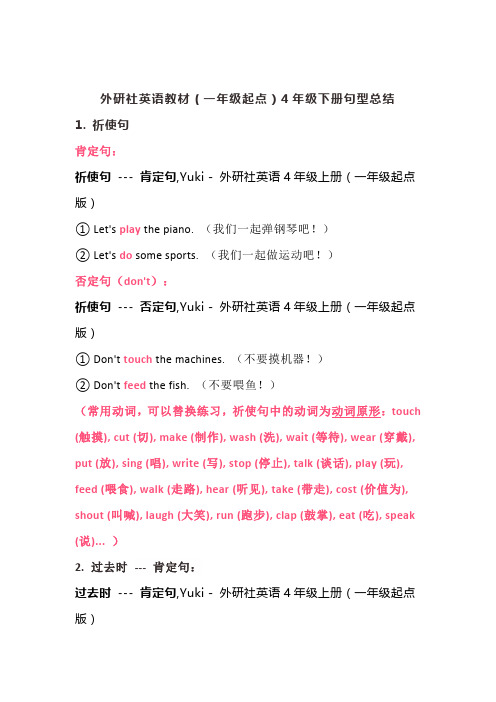
外研社英语教材(一年级起点)4年级下册句型总结1. 祈使句肯定句:祈使句--- 肯定句,Yuki - 外研社英语4年级上册(一年级起点版)① Let's play the piano. (我们一起弹钢琴吧!)② Let's do some sports. (我们一起做运动吧!)否定句(don't):祈使句--- 否定句,Yuki - 外研社英语4年级上册(一年级起点版)① Don't touch the machines. (不要摸机器!)② Don't feed the fish. (不要喂鱼!)(常用动词,可以替换练习,祈使句中的动词为动词原形:touch (触摸), cut (切), make (制作), wash (洗), wait (等待), wear (穿戴), put (放), sing (唱), write (写), stop (停止), talk (谈话), play (玩), feed (喂食), walk (走路), hear (听见), take (带走), cost (价值为), shout (叫喊), laugh (大笑), run (跑步), clap (鼓掌), eat (吃), speak (说)... )2. 过去时--- 肯定句:过去时--- 肯定句,Yuki - 外研社英语4年级上册(一年级起点版)①Once upon a time, there was a boy. He look ed after sheep. (从前有个小男孩,他照看羊(放羊)。
)②The boy ran to the village. (男孩跑到了村子。
)③They said, “Don’t tell lies! ” (他们说道: “别撒谎!”)(常见动词的过去式要注意积累:is - was, look - looked, run - ran, say - said)3. 过去时--- 问句:询问过去做了什么:询问过去做了什么,Yuki - 外研社英语4年级上册(一年级起点版)① What did they play? (他们演奏了什么?)--- Dad play ed the erhu. And Mum play ed the pipa. (爸爸演奏了二胡。
(完整word版)外研版小学英语语法及习题汇总,

小学英语语法及习题一、名词复数规则写出以下各词的复数I _________him _________this ___________her ______watch _______child _______photo ________diary ______day________ foot________ book_______ dress ________ tooth_______ sheep ______box_______ strawberry _____thief _______yo-yo ______ peach______ sandwich ______ man______ woman_______paper_______juice___________water________ milk________ rice__________ tea__________二、一般此刻时一般此刻时用法专练:(一)、写出以下动词的第三人称单数drink ________ go _______ stay ________ make ________ look _________ have_______ pass_______ carry ____come________ watch______ plant_______ fly ________study_______ brush________ do_________ teach_______(二)、用括号内动词的适合形式填空。
1.He often ________(have) dinner at home.2.Daniel and Tommy _______(be) in Class One.3.We _______(not watch) TV on Monday.4.Nick _______(not go) to the zoo on Sunday.5.______ they ________(like) the World Cup?6.What _______they often _______(do) on Saturdays?7._______ your parents _______(read) newspapers every day?8.The girl _______(teach) us English on Sundays.9.She and I ________(take) a walk together every evening.10.There ________(be) some water in the bottle.11.Mike _______(like) cooking.12.They _______(have) the same hobby.13.My aunt _______(look) after her baby carefully.14.You always _______(do) your homework well.15. I _______(be) ill. I’m staying in bed.16.She _______(go) to school from Monday to Friday.17.Liu Tao _______(do) not like PE.18.The child often _______(watch) TV in the evening.19.Su Hai and Su Yang _______(have) eight lessons this term.20.-What day _______(be) it today?-It ’s Saturday.(三)、依据要求改写句子1.Daniel watches TV every evening.(改为否认句 )___________________________________________________2.I do my homework every day.(改为一般疑问句,作否认回答 ) ________________________________________________________3.She likes milk.(改为一般疑问句,作必然回答)___________________________4. Amy likes playing computer games.(改为一般疑问句,作否认回答 )___________________________________________________5. We go to school every morning.(改为否认句)_______________________________________________________ 6. He speaks English very well.(改为否认句)___________________________________________________7. I like taking photos in the park.(对划线部散发问)________________________________________________________ 8.John comes from Canada.( 对划线部散发问 )___________________________________________________9.She is always a good student.(改为一般疑问句,作否认回答)________________________________________________________ 10. Simon and Daniel like going skating.(改为否认句 )___________________________________________________(四)、改错 ( 划犯错误的地方,将正确的写在横线上 )1.Is your brother speakEnglish?__________________2.Does he likes goingfishing?__________________3.He likes play games afterclass.__________________4.Mr. Wu teachs usEnglish.__________________5.She don ’t do her homework on Sundays. _________________三、此刻进行时(一)、写出以下动词的此刻分词:play________ run__________ swim _________make__________ go_________ like________write_________ski___________read________ have_________ sing________dance_________put_________ see________ buy _________ love____________live_______ take_________ come ________ get_________stop_________ sit ________ begin________ shop___________(二)、用所给的动词的正确形式填空:1.The boy __________________ ( draw)a picture now..2. Listen .Some girls _______________ ( sing)in the classroom3. My mother _________________ ( cook )some nicefood now.4.What _____ you ______ ( do ) now?5.Look . They _______________( have) an English lesson .6.They ____________(not ,water) the flowers now.7.Look! the girls ________________(dance )in the classroom .8.What is our granddaughter doing? She _________(listen )to music.9. It’s5o’clock now. We_____________(have)supper now10.______Helen____________(wash )clothes? Yes ,she is .(三)、句型变换:1. They are doing housework .(分别改成一般疑问句和否认句)___________________________________________________________ ___________________________________________________________ 2.The students are cleaning the classroom . (改一般疑问句并作必然和否认回答)___________________________________________________________ ___________________________________________________________ 3.I’m playing the football in the playground .(对划线部分进行发问)___________________________________________________________ 4.Tom is reading books in his study . (对划线部分进行发问)四、未来时练习:填空。
外研社小学英语一年级起点四年级下册 Module5 语法新学:现在进行式练习
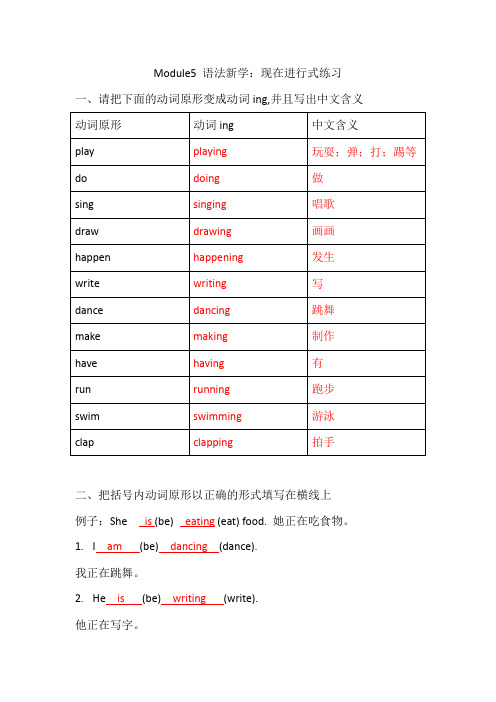
Module5 语法新学:现在进行式练习一、请把下面的动词原形变成动词ing,并且写出中文含义
二、把括号内动词原形以正确的形式填写在横线上
例子:She is (be) eating (eat) food. 她正在吃食物。
1.I am (be)dancing (dance).
我正在跳舞。
2.He is (be)writing (write).
他正在写字。
3.It is (be)running (run).
它正在跑步。
4.She is (be)playing (play) the piano.
她正在弹钢琴。
5.We are (be)swimming (swim).
我们正在游泳。
6.You are (be)doing (do) your homework.
你正在写家庭作业。
7.They are (be)talking (talk).
他们正在说话。
8.Sam is (be)making (make) crisps.
Sam正在制作炸薯条。
9.Amy is (be)drawing (draw) a picture.
Amy正在画画。
10.Mr Smart and Mrs Smart are (be)watching (watch) TV.
斯马特先生和斯马特女生正在看电视。
观察上面的句子,表达的是(过去发生的事情/ 现在发生的事情),我们称这样的句子为(一般过去式/ 现在进行式),
共同的结构特点是be动词加(动词过去式/动词ing)。
外研社(一起)四年级下册 M3知识要点+基础测试

Module 3:单词:shout wolf sheep bored lie village everyone laugh intolesson wouldn’t +would not month cheese scared动词的过去式:look-looked run-raneat-ate shout-shouted am/is-wassay-said come-came laugh-laughedare-were go-went buy-boughtsee-saw break-broke do-didstrike-struck(过去式):敲响、报时learn-learnt短语:1. once upon a time 从前2.look after照看,照管3. run to跑向4. learn a lesson 学习一个教训5. go to a shop / school 去商店/学校6. come to来到7. go into到…里去8. tell lies 说谎9. run away逃跑10. run up/down跑上/跑下句子:1. There was a boy. He looked after sheep.有一个男孩。
他放羊。
2. The next day, the boy ran to the village again. “Wolf, wolf!”he shouted.第二天,男孩又跑到村子里。
“狼来了,狼来了!”他大声喊道。
3. She went into a shop.她走进了一家商店。
语法(隐性语法):1.一般过去时中动词过去式的规则、不规则变化2.sheep的复数形式是sheep。
Module 3单词:呼喊狼绵羊厌倦的乡村每人教训笑谎话进入…里面月份奶酪惊恐的短语:1. 从前2.照看,照管3.跑向4.学习一个教训5.去商店/学校6.来到7.到…里去8.说谎9.逃跑10. 跑上/跑下句子:1.有一个男孩。
外研社(一起)四年级下册 M4知识要点+基础测试
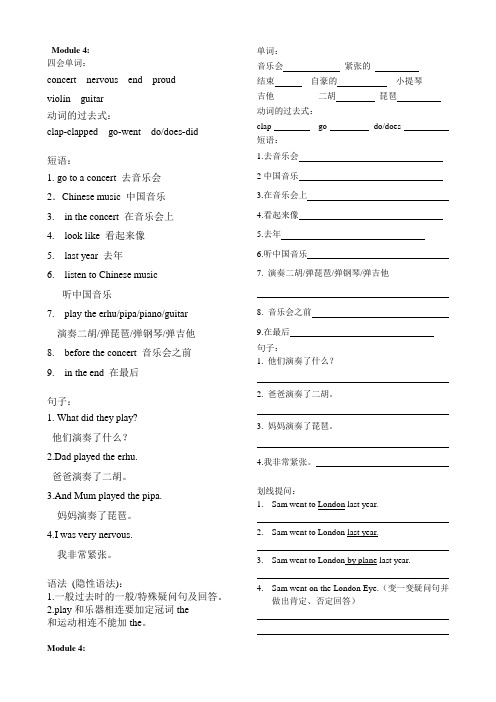
Module 4:四会单词:concert nervous end proudviolin guitar动词的过去式:clap-clapped go-went do/does-did短语:1. go to a concert 去音乐会2.Chinese music 中国音乐3. in the concert 在音乐会上4. look like 看起来像5. last year 去年6. listen to Chinese music听中国音乐7. play the erhu/pipa/piano/guitar演奏二胡/弹琵琶/弹钢琴/弹吉他8. before the concert 音乐会之前9. in the end 在最后句子:1. What did they play?他们演奏了什么?2.Dad played the erhu.爸爸演奏了二胡。
3.And Mum played the pipa.妈妈演奏了琵琶。
4.I was very nervous.我非常紧张。
语法(隐性语法):1.一般过去时的一般/特殊疑问句及回答。
2.play和乐器相连要加定冠词the和运动相连不能加the。
Module 4: 单词:音乐会紧张的结束自豪的小提琴______ 吉他_______ 二胡琵琶动词的过去式:clap- go- do/does-短语:1.去音乐会2中国音乐3.在音乐会上4.看起来像5.去年6.听中国音乐7. 演奏二胡/弹琵琶/弹钢琴/弹吉他8. 音乐会之前9.在最后句子:1. 他们演奏了什么?2. 爸爸演奏了二胡。
3. 妈妈演奏了琵琶。
4.我非常紧张。
划线提问:1.Sam went to London last year.2.Sam went to London last year.3.Sam went to London by plane last year.4.Sam went on the London Eye.(变一变疑问句并做出肯定、否定回答)。
外研社(一起)四年级下册 M5知识要点+基础测试
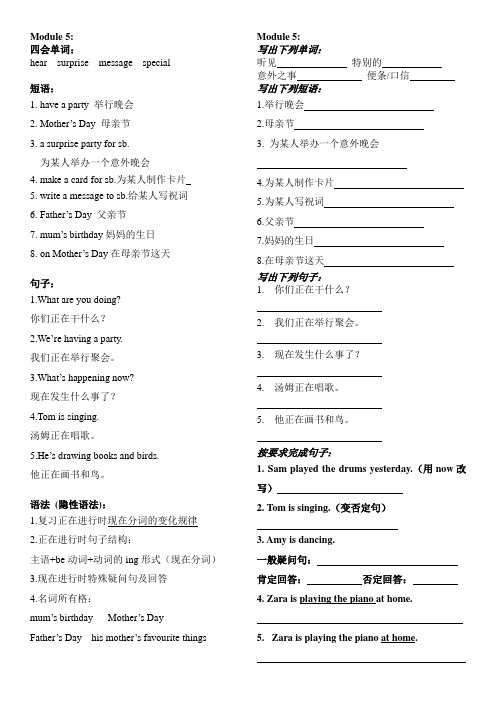
Module 5:四会单词:hear surprise message special短语:1. have a party 举行晚会2. Mother’s Day 母亲节3. a surprise party for sb.为某人举办一个意外晚会4. make a card for sb.为某人制作卡片5. write a message to sb.给某人写祝词6. Father’s Day 父亲节7. mum’s birthday妈妈的生日8. on Mother’s Day在母亲节这天句子:1.What are you doing?你们正在干什么?2.We’re having a party.我们正在举行聚会。
3.What’s happening now?现在发生什么事了?4.Tom is singing.汤姆正在唱歌。
5.He’s drawing books and birds.他正在画书和鸟。
语法(隐性语法):1.复习正在进行时现在分词的变化规律2.正在进行时句子结构:主语+be动词+动词的ing形式(现在分词)3.现在进行时特殊疑问句及回答4.名词所有格:mum’s birthday Mother’s DayFather’s Day his mother’s favourite things Module 5:写出下列单词:听见特别的意外之事便条/口信写出下列短语:1.举行晚会2.母亲节3. 为某人举办一个意外晚会4.为某人制作卡片5.为某人写祝词6.父亲节7.妈妈的生日8.在母亲节这天写出下列句子:1.你们正在干什么?2.我们正在举行聚会。
3.现在发生什么事了?4.汤姆正在唱歌。
5.他正在画书和鸟。
按要求完成句子:1. Sam played the drums yesterday.(用now改写)2. Tom is singing.(变否定句)3. Amy is dancing.一般疑问句:肯定回答:否定回答:4. Zara is playing the piano at home.5.Zara is playing the piano at home.。
外研社小学英语(一年级起点)四年级下知识点整理
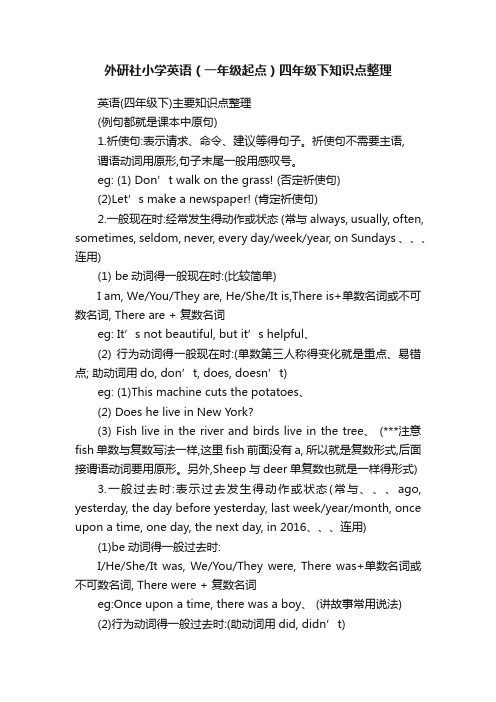
外研社小学英语(一年级起点)四年级下知识点整理英语(四年级下)主要知识点整理(例句都就是课本中原句)1.祈使句:表示请求、命令、建议等得句子。
祈使句不需要主语,谓语动词用原形,句子末尾一般用感叹号。
eg: (1) Don’t walk on the grass! (否定祈使句)(2)Let’s make a newspaper! (肯定祈使句)2.一般现在时:经常发生得动作或状态 (常与always, usually, often, sometimes, seldom, never, every day/week/year, on Sundays 、、、连用)(1) be动词得一般现在时:(比较简单)I am, We/You/They are, He/She/It is,There is+单数名词或不可数名词, There are + 复数名词eg: It’s not beautiful, but it’s helpful、(2) 行为动词得一般现在时:(单数第三人称得变化就是重点、易错点; 助动词用do, don’t, does, doesn’t)eg: (1)This machine cuts the potatoes、(2) Does he live in New York?(3) Fish live in the river and birds live in the tree、 (***注意fish单数与复数写法一样,这里fish前面没有a, 所以就是复数形式,后面接谓语动词要用原形。
另外,Sheep与deer单复数也就是一样得形式)3.一般过去时:表示过去发生得动作或状态(常与、、、ago, yesterday, the day before yesterday, last week/year/month, once upon a time, one day, the next day, in 2016、、、连用)(1)be动词得一般过去时:I/He/She/It was, We/You/They were, There was+单数名词或不可数名词, There were + 复数名词eg:Once upon a time, there was a boy、 (讲故事常用说法)(2)行为动词得一般过去时:(助动词用did, didn’t)①一般动词变化:构成法:1、动词原形+ed、如:look--looked2.以e结尾得词+d、如:live--lived3.以辅音字母+y结尾得词,改y为i, 再加ed、如:study--studied, cry--cried、4.以重读闭音节或r音节结尾,末尾只有一个辅音字母得词,双写这个辅音字母,再加ed、如: clap--clapped,stop--stopped, prefer--preferred②不规则动词变化:如had, said, put, saw, got, ran, learnt(英式写法), bought, came, took, went等eg1: The animals had a concert last week、eg2: The next day, the boy ran to the village again、eg3: What did he play yesterday?eg4: When did you get up last Sunday? I got up at 8 o’clock、4.一般将来时:表示还没有发生但将要发生得事情或动作(常与tomorrow, the day after tomorrow, next year/month/week, soon, in the future, in 、、、 minutes/hours/days、、、连用 )(1)Be going to+ 动词原形:多表示即将发生,最近打算、计划、安排好要做得事情,主观性较强 (区分人称,be动词变化am, is, are) eg: She’s going to visit Australia、(2)Will+动词原形:多表示即将发生得动作或状态,不受主观因素影响得单纯得将来,客观性较强 (不区分人称,都用will)(***目前小学阶段对这两种形式区分并不明显,可以互换使用)eg: We will go to the zoo on Sunday、5.现在进行时:表示正在进行或发生得动作 (常与now, at present, at this moment连用)Be动词+动词得现在分词(***区分人称,注意动词得现在分词构成得特殊情况)动词得现在分词构成法:(1)一般规则:动词+ing, 如: work--working、(2) 以e结尾得动词去掉e加ing、如: live--living, have--having、(3) 以重读闭音节或r音节结尾,末尾只有一个辅音字母得词,双写这个辅音字母,再加ing、如: swim--swimming, clap--clapping, refer--referring、(4) 以ie结尾得重读开音节得词,改ie为y, 再加ing、如: die--dying、eg: (1) What’s happening now?(2) Daming is making a card for his father、(3)We are having a party、6.购物相关话题:(1)I want to buy a pen、(2)It’s expensive/cheap、(3)It costs one hundred and eighteen yuan、(4)Who wants to buy it?7.音乐演奏相关话题:(***演奏乐器前要加定冠词the )(1)I played the piano yesterday、(2)You’re playing the violin for your father、(3)My mum and dad played in the concert、(4)In the end, everyone clapped、(***注意玩球类运动不能加定冠词the, eg:I played football yesterday、 )8.时间相关话题:(1)What’s the time now?(2)What time is it now?(3)It’s 2 o’clock、(4)Is it breakfast/lunch/dinner time now?(5)The Chinese cartoon Shaolin Kids is on TV at 8 o’clock、9.方向相关话题:(1)Where is the library?(2)It’s in the north/south/west/east of China、(3)I went to the north/south/west/east、(4)Beijing is the capital of China、10.原因相关话题:(1)Why do fish live in the river?(2)Because cats can’t live in the water、。
外研社(一起)四年级下册 M1知识要点+基础测试
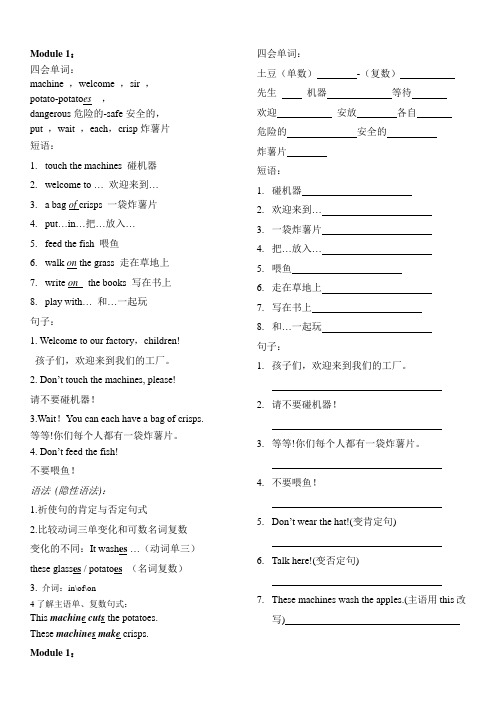
Module 1:四会单词:machine ,welcome ,sir ,potato-potato es,dangerous危险的-safe安全的,put ,wait ,each,crisp炸薯片短语:1.touch the machines 碰机器2.welcome to … 欢迎来到…3. a bag of crisps 一袋炸薯片4.put…in…把…放入…5.feed the fish 喂鱼6.walk on the grass 走在草地上7.write on the books 写在书上8.play with… 和…一起玩句子:1. Welcome to our factory,children!孩子们,欢迎来到我们的工厂。
2. Don’t touch the machines, please!请不要碰机器!3.Wait!You can each have a bag of crisps. 等等!你们每个人都有一袋炸薯片。
4. Don’t feed the fish!不要喂鱼!语法(隐性语法):1.祈使句的肯定与否定句式2.比较动词三单变化和可数名词复数变化的不同:It wash es…(动词单三)these glass es / potato es(名词复数)3.介词:in\of\on4了解主语单、复数句式:This machine cuts the potatoes.These machines make crisps.Module 1:四会单词:土豆(单数)-(复数)先生机器等待欢迎安放各自危险的安全的炸薯片短语:1.碰机器2.欢迎来到…3.一袋炸薯片4.把…放入…5.喂鱼6.走在草地上7.写在书上8.和…一起玩句子:1.孩子们,欢迎来到我们的工厂。
2.请不要碰机器!3.等等!你们每个人都有一袋炸薯片。
4.不要喂鱼!5.Don’t wear the hat!(变肯定句)6.Talk here!(变否定句)7.These machines wash the apples.(主语用this改写)。
外研社小学英语一年级起点四年级下册 知识点汇总
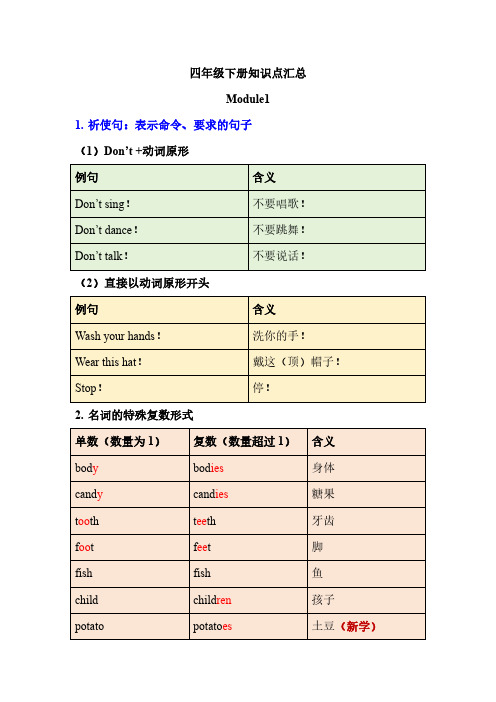
四年级下册知识点汇总Module11.祈使句:表示命令、要求的句子(1)Don’t+动词原形(2)直接以动词原形开头2.名词的特殊复数形式3.this和these的区别Module21.重点句型1—Is It....?—肯定回答:Yes,it is.否定回答:No,it isn’t.(isn’t=is not)举例:(1)—Is it expensive?它贵吗?—No,it isn’t.不,它不贵。
(2)—Is it big?它大吗?—Yes,it is.是的,它大。
(3)—Is it a pen?它是一只钢笔吗?—Yes,it is.是的,它是。
2.重点句型2—What colour is it?它是什么颜色?—It’s pink/blue/yellow/其他颜色.它是粉色/蓝色/黄色/其他颜色。
3.重点句型3It/某一件物品costs+数字+yuan.它/某一件物品花了多少元。
举例:It costs one hundred and eight yuan.它花了108元。
It costs30yuan.它花了30元。
This pen costs nineteen yuan.这只钢笔花了19元。
This pen costs one yuan.这只钢笔花了1元。
This bag costs one hundred and thirty yuan.这个书包花了130元。
Module3动词过去式相关的语法1.肯定句:动词过去式Chinese people invented paper.中国人发明了纸。
We went to the Great Wall.我们去了长城。
Ma Liang helped people.马良帮助了人们。
观察上面肯定句,invented、went、helped是动词过去式练习:把括号内的动词以正确的形式填写在横线上①She__________(come up)at school last week.②Sam______(learn)Chinese yesterday.③Lingling______(look after)her grandma last Sunday.④“Help,help!”,this boy_____(shout)yesterday.⑤“You naughty pig.”,this girl______(laugh)yesterday.2.否定句(1)否定句:didn’t+动词原形Chinese people didn’t invent bikes.中国人没有发明自行车。
- 1、下载文档前请自行甄别文档内容的完整性,平台不提供额外的编辑、内容补充、找答案等附加服务。
- 2、"仅部分预览"的文档,不可在线预览部分如存在完整性等问题,可反馈申请退款(可完整预览的文档不适用该条件!)。
- 3、如文档侵犯您的权益,请联系客服反馈,我们会尽快为您处理(人工客服工作时间:9:00-18:30)。
外研社英语一起四年级上语法总结及练习题
祈使句
表达说话人对对方的叮嘱、劝告、请求或命令等,往往有表示请求、命令、希望、禁止、劝告等意思.
祈使句一般没有主语,实际上是省略了主语“You”.句末用感叹号或句号,用降调朗读.肯定结构都以动词原形开头.
祈使句的肯定句式有三种形式,即
1)Do型(以行为动词原形开头),例如:Sit down 坐下! Stand up 起立!
2)Be型(以be开头),例如:Be quiet!安静!
3)Let型(以let开头),例如:Let me help you.
祈使句的否定结构是以“Don’t+动词原形”开头.例如:
Don’t go there,please.请别去那儿.
Don’t be late.不要迟到
用括号内所给动词的适当形式填空。
1. __________ (not, be) late.
2. ____________ (dust) the dressing table.
3. ____________ (not, speak) with your mouth full of food.
4. ____________ (not, talk) and ____________ (read) a book.
5. ____________ (not, drop) the nice vase, Sam.
6. ____________ (look) out! A car is coming.
7. ____________ (give) us ten years and just see what our country will be like.
8. ____________ (not, let) the baby cry.
9. ____________ (open) the window and ____________ (shut) the door.
10. Let’s ____________ (sweep) the floor.
根据要求改写句子
1. Will you please read it again more slowly? (改为祈使句)
__________ __________ again more slowly, please.
2. Please sit next to Nancy. (改为否定句)
__________ __________ next to Nancy.
3. Come to my house tomorrow. (改为否定句)
__________ come to my house tomorrow.
4. Wear the glasses! (改为否定句)
___________ wear the glasses!
5. Don’t wash your hands! (改成肯定句)
___________ your hands!
一般过去时
时间状语:
1.yesterday,morning(afternoon,evening)等
2.由“last+一时间名词”构成的短语:last night,last year(winter,month,week)等
3.由“时间段+ago”构成的短语:a moment ago,a short time ago,an hour ago等
4.其它:just now等
Was,were的一般过去时构成:
肯定句式:主语+be(was,were)+其它.
否定句式:主语+be(was,were)+not+其它.
一般疑问句:Be(was,were)+主语+其它?
肯定回答: Yes, 主语+ be(was,were)
否定回答:No, 主语+be(was,were)+not.
含有实义动词(行为动词)的一般过去时的主结构:
构成:
肯定句:主语+动词的过去时+其它。
否定句:主语+did+not+动词原形+其它。
did not缩写为didn’t
一般疑问句:Did+主语+动词原形+其它?
特殊疑问句:特殊疑问词+did+主语+动词原形+其它?
动词的适当形式填空
1. I________up at half past six this morning.(get)
2. My mother____________a lot of fruit yesterday afternoon.(buy)
3. They_________________a meeting yesterday.(not have)
4. The twins_________thirteen two years ago.(be)
5. I_________(have)an exciting party last weekend.
6. They all_________(go)to the mountains yesterday morning.
7. She_________ (not visit)her aunt last weekend.She________(stay)at home.
8. He __________(work) in that bank four years ago.
9. I __________(see) him yesterday.
10. The boy __________(have) a bad cold yesterday.
11. He __________(tell) a story to his daughter yesterday.
12. I __________(buy) a coat just now..
用括号里动词的适当形式填空
Last year Mr. Smith ___________ (go ) to China and Japan. He ___________ (have) a wonderful time. He ___________ (do) a lot of different things and ___________ (talk) to a great number of different people. He ___________ (eat) Chinese and Japanese food and ___________ (visit) a lot of interesting places. When he ___________ (go) back to England, he ___________ (be) very tired.
现在进行时
定义:表示现在或现阶段正在进行或发生的动作或存在的状态。
构成:由be(am/is/are)+动词-ing形式构成
常用的时间状语:“now”“look”“listen”“at the (this) moment”.
I am doing my homework now.
Look! My mother is running
Listen! They are reading.
At the (this) moment, he is only weeping.
1. A: What is she_____________(do)?
B: She_______________(cook)dinner in the kitchen now.
2. Listen! Who _________________(sing)?
3. A: What___________ they ____________(do)?
B: They__________________(run)on the grass now.
4. Are they_____________(fly)kites? Yes, they are.
5. A: ___________the girls____________(catch)the butterflies?
B: No, they aren't. They____________ (pick)up leaves.
6. Bob _______________(swim)in the pool now.
7. They are_______________(make) a snowman.
8. The boys _________________(take) pictures in the garden now.
9. It's 12:00,the students ______________(have) lunch in the canteen now.
10. My father_______________(wash) his car outside now.
11. A: ______________ your brothers ______________(play) computer games now? B: Yes, they are.
12. I like_____________(dive) and________________(swim).
13. Look! The kangaroo_______________(jump), and the panda_________________ (sleep).。
